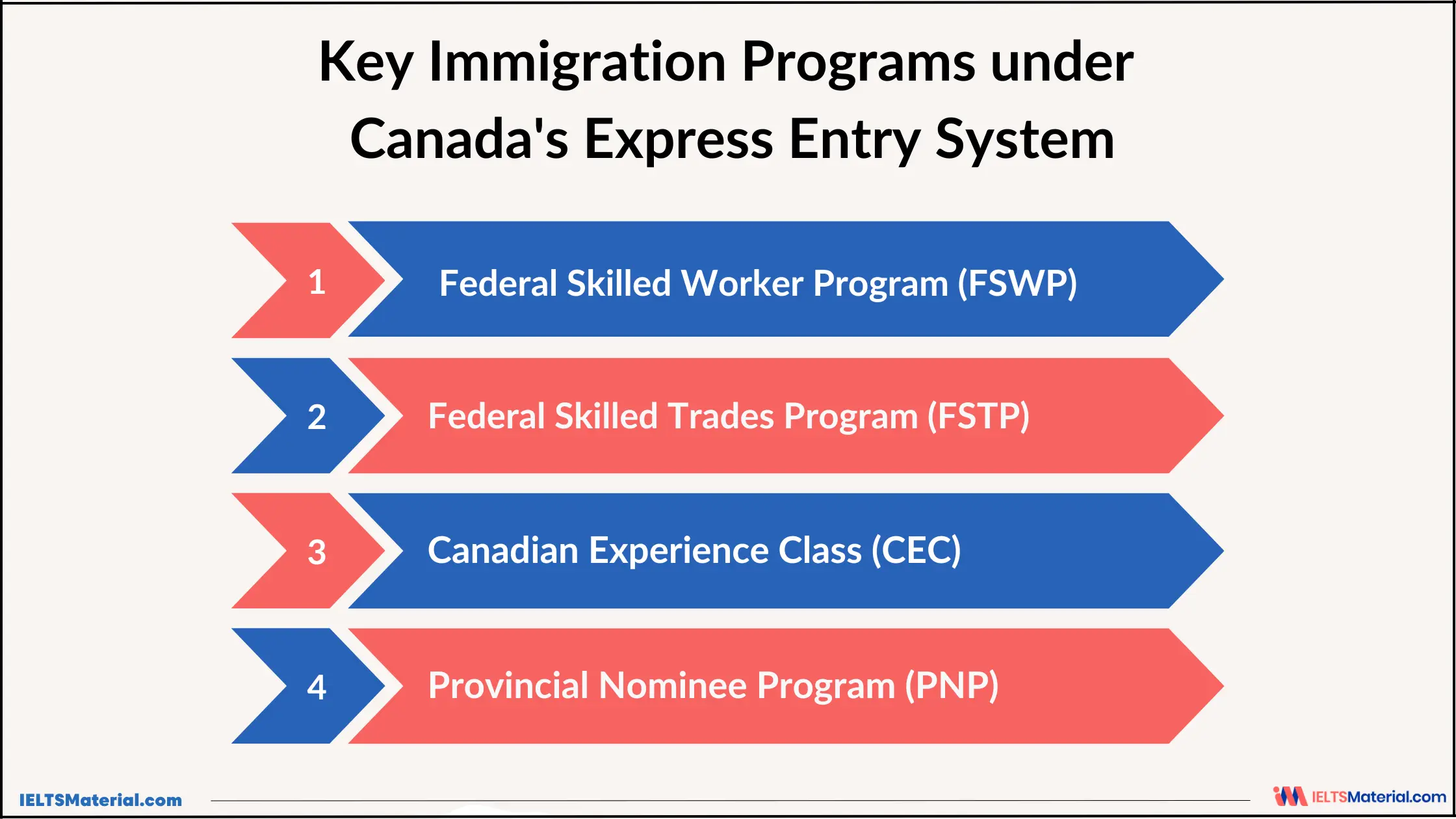Canada PR Points: Eligibility, CRS Points Calculation, and Express Entry System
8 min read
Updated On
-
Copy link
Table of Contents
- Understanding the Canada PR Points System
- Factors Affecting Canada CRS Score
- Factors Affecting Canada Express Entry System
- How to Increase CRS Score for Canada PR?
- Key Immigration Programs under Canada Express Entry System
- How to Calculate Canada PR Points?
- How Much CRS Score is Required for Canada PR?
- Processing Time for Canada PR Applications
- Additional Resources:

Limited-Time Offer : Access a FREE 10-Day IELTS Study Plan!
In this blog, we’ll delve into the key aspects of the Canada PR points system, including how to calculate your CRS score for Canada. By understanding the Canada PR points table and the express entry points, you can maximize your chances of obtaining permanent residency. Generally, the minimum CRS score points required to apply for a Canada PR is 60 points out of 100. Also, at least 67 points out of 100 is required to create an express entry profile which can get you an additional 600 points, if shortlisted.
Let us, guide you through eligibility criteria, processing times, and strategies to improve your CRS score, to ensure a smooth path to becoming a permanent resident in Canada.
Understanding the Canada PR Points System
The Canada PR Points System is a method used by the Canadian government to assess and select candidates for permanent residency in the country. It operates under the Express Entry system and evaluates applicants based on various factors such as age, education, work experience, language proficiency, and adaptability.
Each factor is assigned maximum points, and candidates are ranked based on their total score. The higher the score, the better the chances of receiving an Invitation to Apply (ITA) for permanent residency. Your CRS score, with a maximum of 3600 points, is pivotal in determining your eligibility for permanent residency. The system aims to attract skilled immigrants who can contribute to the Canadian economy and society.
Let’s explore how each of these factors influences your CRS score and your chances of becoming a permanent resident in Canada.
Factors Affecting Canada CRS Score
The Comprehensive Ranking System (CRS) is pivotal in determining eligibility for Canada Permanent Residency (PR), assessing various factors that contribute to a candidate’s CRS score. Here’s a detailed table outlining these factors:
| Factor Category | Description |
| Core Human Capital Factors | Includes age, education (level and field of study), official language proficiency (English/French), and Canadian work experience. |
| Spouse or Common-Law Partner Factors | Considers spouse’s education, language proficiency, and Canadian work experience, impacting CRS points. |
| Skill Transferability Factors | Awards points for combinations of education, language skills, and work experience that enhance employability in Canada. |
| Additional Points | Additional points can be obtained through factors like a provincial nomination, Canadian job offers, or a valid job offer in a high-demand occupation. |
Factors Affecting Canada Express Entry System
The Express Entry system is the primary pathway for skilled immigrants to obtain Canada Permanent Residency (PR). Points under this system are awarded based on specific factors that assess a candidate’s suitability for immigration. Here’s an overview of the key factors influencing Canada PR points:
| Factor | Description | Maximum Points |
| Age | Points are granted depending on the applicant’s age at the time of application. | Up to 110 |
| Education | Points are awarded based on the highest level of education completed by the applicant. | Up to 150 |
| Language Proficiency | Points are awarded for proficiency in English and/or French, assessed through language tests. | Up to 160 |
| Work Experience | Points are awarded based on the number of years of full-time or part-time work experience. | Up to 80 |
| Adaptability | Points are awarded for factors such as previous study or work experience in Canada, spouse’s education or work experience, or relatives living in Canada. | Up to 100 |
| Arranged Employment | Points are allocated if the applicant possesses a legitimate job offer from a Canadian employer. | Up to 200 |
| Provincial Nomination | Points are awarded if the applicant receives a nomination from a Canadian province or territory. | 600 |
| Spouse or Common-law Partner Factors | Points are awarded for the spouse’s education, language proficiency, and work experience. | Up to 40 |
| Skill Transferability | Points are awarded based on a combination of education, language ability, work experience, and whether the applicant has a certificate of qualification in a skilled trade. | Up to 100 |
| Canadian Study Experience | Points are awarded if the applicant has completed at least two academic years of full-time study at a Canadian secondary or post-secondary institution. | 30 |
How to Increase CRS Score for Canada PR?
To achieve a high points score for Canada PR, applicants should focus on maximizing points in key areas such as:
1 Education: Obtain an Educational Credential Assessment (ECA) to validate foreign education credentials and ensure maximum points are awarded based on the highest level of education completed.
2 Language Proficiency: Aim for high scores in language proficiency tests such as IELTS (English) or TEF (French). Consistent practice and preparation can help improve language skills and maximize points.
3 Work Experience: Gain relevant work experience in a skilled occupation to earn points based on the number of years worked. Consider obtaining Canadian work experience through programs like the Canadian Experience Class (CEC) or securing a valid job offer for additional points.
4 Age: Apply for permanent residency at a younger age to maximize points in the age category. The points decrease progressively as the applicant ages.
5 Adaptability: Leverage adaptability factors such as previous study or work experience in Canada, having a spouse with Canadian education or work experience, or having relatives living in Canada to earn additional points.
6 Provincial Nomination: Explore opportunities for provincial nomination through the Provincial Nominee Programs (PNPs) to secure 600 additional points, significantly boosting CRS scores.
Looking to boost your English language proficiency?
Join our expert-led classes now!
Key Immigration Programs under Canada Express Entry System
The Canada Express Entry is an online system that the Canadian Government uses to manage permanent residence applications for the following programs:
- Federal Skilled Worker Programme (FSWP)
- Federal Skilled Trades Program (FSTP)
- Canadian Experience Class (CEC)
- Provincial Nominee Program (PNP)
Let us discuss these programmes in detail below:

1 Federal Skilled Worker Program (FSWP)
The Federal Skilled Worker Program (FSWP) targets skilled workers from around the world who possess the qualifications, work experience, and language proficiency necessary to contribute to Canada’s economy.
2 Federal Skilled Trades Program (FSTP)
The Federal Skilled Trades Program (FSTP) is aimed at skilled workers with experience in specific trades who intend to settle in Canada, excluding Quebec. To qualify, applicants must meet criteria related to their work experience, language proficiency, and other specified requirements. Successful candidates can apply for permanent residency through Express Entry.
3 Canadian Experience Class (CEC)
The Canadian Experience Class (CEC) targets individuals who have gained skilled work experience in Canada and wish to transition to permanent residency. Applicants must have at least one year of skilled work experience in Canada, meet language proficiency requirements, and plan to reside outside of Quebec. Eligible candidates can apply for permanent residency through Express Entry.
4 Provincial Nominee Program (PNP)
The Provincial Nominee Program (PNP) allows Canadian provinces and territories to nominate individuals for permanent residency who have the skills and experience required by their local labor markets. Each province and territory has its own streams and criteria tailored to their specific economic needs.
How to Calculate Canada PR Points?
Calculating your Canada PR points involves assessing different factors such as education, language proficiency, work experience, age, adaptability, and more. These factors contribute to your overall Comprehensive Ranking System (CRS) score if you are applying through the Express Entry system, or if they are directly assessed under other immigration streams.
To calculate Canada PR points accurately, it’s essential to refer to the official Government of Canada website, which provides the most up-to-date and accurate information. You can access the official Canada PR points calculator tool here.
Using the Points Calculator:
1 Visit the official Government of Canada website’s immigration section.
2 Navigate to the Express Entry or relevant immigration program page.
3 Access the points calculator tool.
4 Input your information accurately for each category.
5 The calculator will generate your CRS score or PR points based on the information provided.
How Much CRS Score is Required for Canada PR?
As mentioned before, first of all, candidates need to get the minimum CRS score points of 60/100 to apply for a Canada PR, and to create an express entry profile, at least 67/100 points is required. Achieving a good score in the Canada PR points system largely depends on the specific immigration program you are applying for. For example, under the Federal Skilled Worker Program (FSWP) stream of the Express Entry system, the maximum points a candidate can score is 1200. However, the Comprehensive Ranking System (CRS) score, which determines a candidate’s rank in the Express Entry pool, can vary depending on the draw.
Typically, a CRS score above 450-470 is considered competitive, increasing the likelihood of receiving an Invitation to Apply (ITA) for permanent residency. However, meeting the minimum CRS cutoff score for a particular draw is crucial for receiving an ITA.
Processing Time for Canada PR Applications
The processing time for Canada PR applications differ based on the type of application, such as:
Express Entry System Processing Time
- Processing time for applications submitted through the Express Entry system can vary widely based on several factors. These include the volume of applications received, the completeness of your application, and the specific immigration program you are applying under (FSWP, FSTP, CEC, or PNP).
- On average, candidates who receive an Invitation to Apply (ITA) through Express Entry can expect processing times ranging from six months to a year for their permanent residency applications to be finalized
Provincial Nominee Program (PNP) Processing Time:
- Processing times for applications submitted through the Provincial Nominee Program (PNP) can vary significantly depending on the specific province or territory you are applying to.
- Each province or territory has its own processing times, which can range from a few months to over a year. Factors such as the complexity of the application and the efficiency of the provincial immigration office can also impact processing times.
Additional Processing Time Factors:
Several additional factors can influence processing times for Canada PR applications. These include the completeness and accuracy of your application, the submission of required documentation, and any requests for additional information or clarification from immigration authorities.
Understanding how to calculate Canada PR points is the first step towards a successful immigration journey. By utilizing the official points calculator and ensuring you meet eligibility requirements, you can enhance your chances of receiving an Invitation to Apply (ITA) for permanent residency in Canada. Remember to stay updated with any changes in immigration policies and requirements to make informed decisions.
Additional Resources:
Frequently Asked Questions
Are 67 points sufficient for the Express Entry program?
Are 67 points required for the CEC program?
Is a score of 67 necessary for all program applicants?
How can you improve your points score?
How to calculate your FSWP/FSTP score?
Explore IELTS related articles

Start Preparing for IELTS: Get Your 10-Day Study Plan Today!
Explore Canada PR Articles

Janice Thompson

Janice Thompson

Janice Thompson

Janice Thompson








Post your Comments